
The prime minister of India is the head of government of the Republic of India. Executive authority is vested in the prime minister and his chosen Council of Ministers, despite the president of India being the nominal head of the executive. The prime minister has to be a member of one of the houses of bicameral Parliament of India, alongside heading the respective house. The prime minister and his cabinet are at all times responsible to the Lok Sabha.
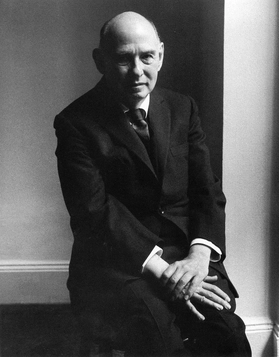
William Shawn was an American magazine editor who edited The New Yorker from 1952 until 1987.

Pearl Street is a street in the Financial District in Lower Manhattan, running northeast from Battery Park to the Brooklyn Bridge with an interruption at Fulton Street, where Pearl Street's alignment west of Fulton Street shifts one block south of its alignment east of Fulton Street, then turning west and terminating at Centre Street.
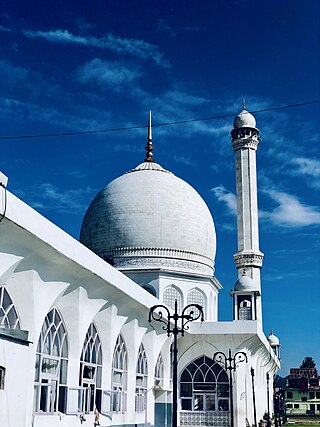
The Hazratbal Shrine, popularly called Dargah Sharif, is a Muslim shrine located in Hazratbal locality of Srinagar in Jammu and Kashmir, India. It contains a relic, Moi-e-Muqqadas, believed to be the hair of the Islamic prophet Muhammad. It is situated on the northern bank of the Dal Lake in Srinagar, and is considered to be Kashmir's holiest Muslim shrine.

The New Yorker Hotel is a mixed-use hotel building at 481 Eighth Avenue in the Hell's Kitchen neighborhood of Manhattan in New York City. Opened in 1930, the New Yorker Hotel was designed by Sugarman and Berger in the Art Deco style and is 42 stories high, with four basement stories. The hotel building is owned by the Unification Church, which rents out the lower stories as offices and dormitories. The upper stories comprise The New Yorker, A Wyndham Hotel, which has 1,083 guestrooms and is operated by Wyndham Hotels & Resorts. The 1-million-square-foot (93,000-square-meter) building also contains two restaurants and approximately 33,000 square feet (3,100 m2) of conference space.

Lucinda Laura Franks was an American journalist, novelist, and memoirist. Franks won a Pulitzer Prize in 1971 for her reporting on the life of Diana Oughton, a member of Weather Underground. With that award she became the first woman to win a Pulitzer for National Reporting, and the youngest person ever to win any Pulitzer. She published four books, including two memoirs, and worked as a staff writer at The New York Times and The New Yorker.
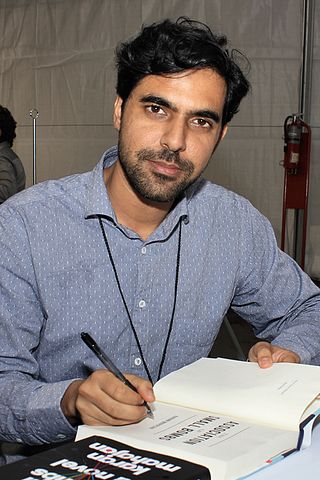
Karan Mahajan is an Indian-American novelist, essayist, and critic. His second novel, The Association of Small Bombs, was a finalist for the 2016 National Book Award for Fiction. He has contributed writing to The Believer, The Daily Beast, the San Francisco Chronicle, Granta, and The New Yorker. In 2017, he was named one of Granta's Best Young American Novelists.

Lauren Groff is an American novelist and short story writer. She has written five novels and two short story collections, including Fates and Furies (2015), Florida (2018), Matrix (2022), and The Vaster Wilds (2023).
Maureen Theresa Howard was an American novelist, memoirist, and editor. Her award-winning novels feature women protagonists and are known for formal innovation and a focus on the Irish-American experience.
Punjabiyat, meaning "Punjabiness", is a movement amongst Punjabis that supports closer links with their cultural traditions and lifestyle. It also supports language revitalization of Punjabi.

Hansa Jivraj Mehta was a reformist, social activist, educator, independence activist, feminist and writer from India. She was one of only two women delegates working alongside Eleanor Roosevelt in the UN Human Rights Commission 1946-48 ensuring the wording "all human beings" instead of "all men" in the Universal Declaration of Human Rights.
Jim Rasenberger is an American writer, born in Washington, D.C. and living in New York City. He has published four books, and contributed to many publications, especially the New York Times, Vanity Fair, and Smithsonian.
Akash Kapur is a writer, academic, and technology policy specialist. He is the author of two books, India Becoming and Better to Have Gone. He has consulted or worked at a number of organizations on technology policy, including UNDP, NYU, Princeton, and New America.

Patricia Lockwood is an American poet, novelist, and essayist. Beginning a career in poetry, her collections include Motherland Fatherland Homelandsexuals, a 2014 New York Times Notable Book. Later prose works received more exposure and notoriety. She is a multiple award winner: her 2017 memoir Priestdaddy won the Thurber Prize for American Humor and her 2021 debut novel, No One Is Talking About This, won the Dylan Thomas Prize. In addition to her writing activities, she has been a contributing editor for the London Review of Books since 2019.
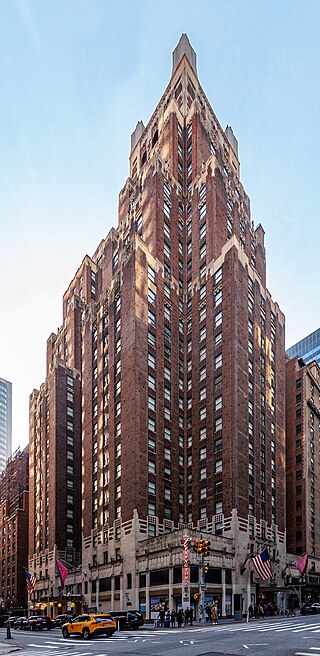
The Lexington Hotel, Autograph Collection is a hotel at 509 Lexington Avenue, at the southeast corner with 48th Street, in the Midtown Manhattan neighborhood of New York City. The 27-story hotel was designed by Schultze & Weaver in the Romanesque Revival style and contains 725 rooms. The Lexington, one of several large hotels developed around Grand Central Terminal as part of Terminal City, is a New York City designated landmark.

Hampshire House is an apartment building and hotel located at 150 Central Park South in Manhattan, New York City, on the southern edge of Central Park between Sixth and Seventh Avenues. It contains 155 apartments on 36 floors.
This article contains information about the literary events and publications of 2020.

A Promised Land is a memoir by Barack Obama, the 44th president of the United States from 2009 to 2017. Published on November 17, 2020, it is the first of a planned two-volume series. Remaining focused on his political career, the presidential memoir documents Obama's life from his early years through to the events surrounding the killing of Osama bin Laden in May 2011. The book is 768 pages long and available in digital, paperback, and hardcover formats and has been translated into two dozen languages. There is also a 29-hour audiobook edition that is read by Obama himself.
This article contains information about the literary events and publications of 2021.
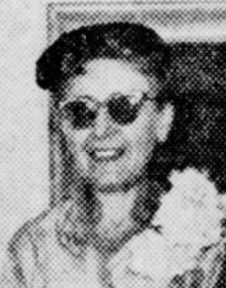
Rose Resnick was an American musician, educator, and philanthropist. She was co-founder and co-director of the Enchanted Hills Camp for the Blind in California, and a leader in San Francisco's blind community for decades.














